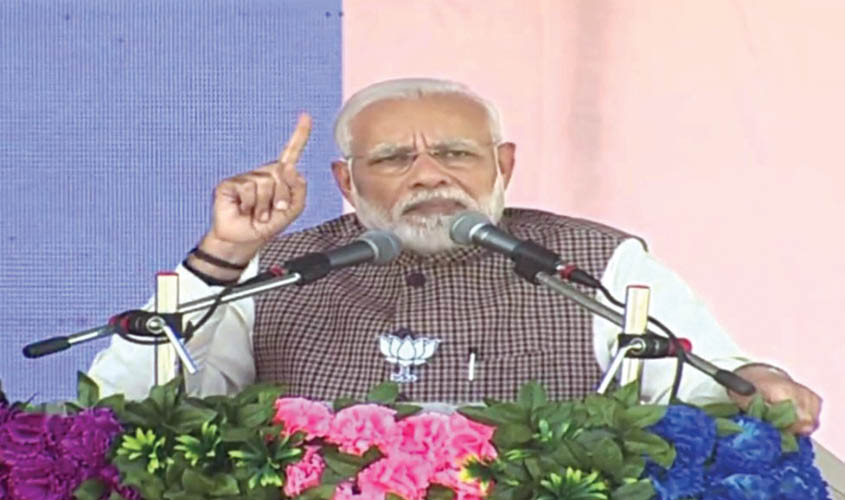New Delhi: The election results in Madhya Pradesh, Rajasthan and Chhattisgarh, the three major states located in the “Hindi heartland”, have set the warning bells ringing not only in the Modi-Shah camp but also in other sections of the ruling dispensation at the Centre. A lot of stakes are at risk for the BJP organisation as a cadre-based party as well as for Rashtriya Swayamsevak Sangh (RSS) as the ruling party’s ideological master.
Lame excuses of anti-incumbency or Congress offer of loan waiver may be given by the BJP for public consumption but its leadership cannot afford to ignore any more a major aspect behind its defeat in these three states, especially Madhya Pradesh where the party organisation is too strong to be bullied and sullied by a lacklustre Congress, that Modi government unwittingly got trapped in an ideological war that was unleashed by the Left-Congress combine in its initial years, wasting much time, energy and resources in fighting a battle of perceptions.
The Left-leaning marauders, using their clout and grip over the media and judiciary, kept hounding the government on each and every issue at hand in a manner that it created sort of a fear psychosis in the ruling dispensation, forcing it to hold back from taking strong decisions like going the whole-hog in cracking down on corruption and compelled its hands to freeze, at least for the time being, the core issues that are so close to the hearts of its primary and long-time vote bank, especially in the “cow belt”.
The combine’s consistent ideological onslaught kept the Modi government engaged in a virtual war against a non-existent enemy and left it with little time to address its core issues like construction of Ram temple in Ayodhya, abrogation of Articles 370 and 35A to resolve the Kashmir vortex, common civil code, denationalisation of Hindu temples and other endowments, protection of cow and her progeny, non-appeasement of minorities, tackling the problem of illegal migrants, rewriting history from the nationalist point of view and bringing in Swadeshi policies, among a host of others.
With its back to the wall due to persistent media offensive, Modi government always remained on the edge whenever an incident occurred anywhere in the country. The ruling dispensation was kept busy defending itself all the time. It had to use all its might and deploy all its best hands on the job, instead of engaging them in creative and innovative work for the welfare of society.
Obviously, all this distracted the government from concentrating on governance issues and devoting enough time to its cadre and core vote bank. As a result, it created distrust between the party organisation and its committed supporters, while providing the scam-tainted Congress a breather and a beleaguered Opposition ample time to reorganise themselves and sharpen their attacks on the government.
A sense of disappointment and detachment set in among the BJP’s loyal voters as they started feeling that either the government is unwilling to deliver the goods or incapable of getting things done or both. Observers are now strongly opining that this feeling of detachment and widening distrust within its original support base, in fact, did the party in.
Temporary side-effects of demonetisation and teething troubles in implementing Goods and Services Tax (GST) system as well as burning issues like mob-lynching incidents, farmer unrest and high petro prices only added to its woes. Though reports clearly suggest that party workers were not involved in any of the lynching cases, the government was always at the receiving end of a massive adverse media campaign prompted by the Left-liberal brigade.
As far as demonetisation is concerned, Prime Minister Narendra Modi took a step which even a ruthless leader like Indira Gandhi did not dare to, as she knew well that the electorate always expects visible financial gains from the government they have elected and they are satisfied with short-term schemes. She did not go for the mammoth exercise in 1971-72 despite communist leaders backing it as she was aware that voters would not like to face even temporary difficulties due to implementation of a radical measure, how beneficial it may be in the long run.
A micro-analysis would show that the twin steps of demonetisation and implementation of GST have cleansed the economy to a good extent, and these are only the first steps towards building a healthy economy with some more additional steps taken in future. But, as it is said, public memory is very short. People start cribbing the moment they face problems when a major corrective measure is taken and swear to teach the party in government a lesson in the next polls while the Opposition is always there to take advantage of the situation by amplifying such things out of proportion.
Indian electorate has always been driven by emotion more than logic. Let us take, for example, the Ayodhya dispute, the most emotive issue in hand right now. There is a strong tide turning against the government’s lethargy in resolving the issue in the last four and half years. People are not happy with Modi government’s stance and fume that a matter of faith of this proportion should not be left to the whims and fancies of a few judges and the government should do something on its own.
Another issue that is agitating the pro-right intellectuals in the country is the Kashmir issue. BJP’s tactical alliance with People’s Democratic Party (PDP) to form a coalition government in Jammu and Kashmir created a lot of resentment even amongst its strong supporters. It did not go down well with them, given the PDP’s proximity to Pakistan-backed separatists.
The decision is, however, proving far-reaching as even a nationalist party like BJP is slowly gaining a foothold in the Valley, the hot-bed of Pakistan-sponsored terrorism, as a consequence. Anyway, even a month or two is a long time in politics and time will tell what is in store for the party.

